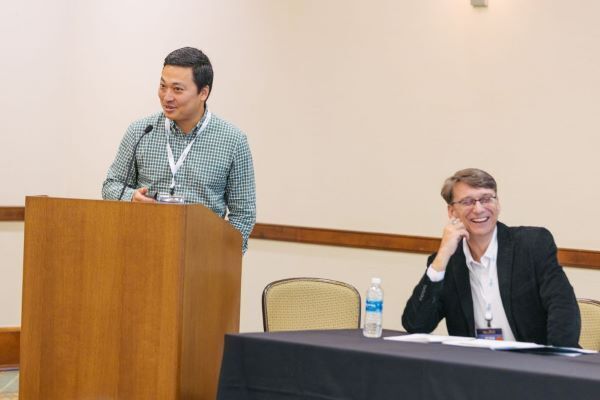
2024 ICRN Convening:
The second ICRN gathering occurred in Phoenix, AZ, on October 17-18, 2024. This event brought together diverse voices and expertise from around the world. Over two days, participants engaged in collaborative discussions, refined research questions, and laid the groundwork for patient-centered initiatives to improve care and accelerate the development of treatments.
Goals of the Meeting:
- Collaborate: Forge new connections and enhance existing ones across areas of expertise for PSC and related diseases: PSC-IBD (Inflammatory Bowel Disease) and PSC-CCA (Cholangiocarcinoma).
- Create: Generate lists of potential research projects and high-priority proposals, seek input from the patient community, pursue funding, and drive research forward.
- Strategize: Identify research questions, models, or tools to enable or accelerate the development of novel therapies for PSC, refining the research strategy to reflect cutting-edge science and ICRN priorities.
Event co-chairs:
Yury Popov, MD, PhD
Bettina Hansen, PhD
Working Groups:
Six Working Groups, each with co-chairs representing the patient community and clinical or academic research, focused on:
- Pathophysiology of PSC: Inflammation and Fibrosis
- Pathophysiology of PSC: Gut Microbiome
- Diagnosis, Prognosis, and Clinical Management
- Clinical Trials and Endpoints
- Managing Transplants and Recurrent PSC
- CCA Screening, Surveillance, and Treatment
Activities and Output:
- Day 1: Each Working Group held a 2-hour brainstorming session, resulting in:
- Lists of potential priority research questions
- Lists of potential research projects
- Proposal topics selected for prioritization on Day 2
- Day 2: Each Working Group had a 90-minute proposal development session, resulting in:
- Executive Summaries
- Details of what, why, how, and who
- Considerations for patient partnerships and pediatrics
Commitment:
PSC Partners has committed $200,000 USD to fund one ICRN project, with funding distributed over two years starting in 2025. Additional funding may be secured through crowdfunding if needed.
Proposal Selection Process:
- Community survey to evaluate potential rankings and determine willingness to donate or engage in crowdfunding
- PSC Partners’ leadership will evaluate projects based on alignment with the research strategy and other initiatives.
This initiative represents a significant step towards transforming the future of PSC research through innovation, partnership, and patient-centered action.
Ways to Get Involved:
These are the ways community members can actively contribute and stay engaged with the ICRN initiative:
- You can provide financial contributions or assist with crowdfunding efforts.
- Stay tuned for future opportunities, including reviewing upcoming projects, serving on advisory committees, recruiting participants, and attending convenings.




